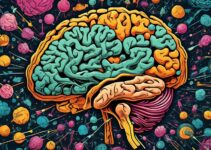If you've ever pondered the potential long-term effects of incorporating nootropic supplements into your daily routine, you're certainly not alone. The quest for optimal cognitive function has led many to explore the realm of nootropics, but the lingering question remains: what impact do these supplements truly have on brain health over time? As you navigate through the maze of scientific research and anecdotal evidence, it's essential to consider the nuances of nootropic ingredients and their potential ramifications. But before diving into the details, one must first understand the fundamental mechanisms at play and how they contribute to the broader landscape of brain health.
Key Takeaways
- Certain nootropic ingredients have neuroprotective properties and may support brain health and protect against cognitive decline.
- Nootropic ingredients can enhance neuronal communication and neuroplasticity, contributing to improved brain function over the long term.
- The antioxidant properties of some nootropic ingredients help combat oxidative stress, which is beneficial for brain health and longevity.
- Nootropic ingredients such as Omega-3 fatty acids, Bacopa Monnieri, Ginkgo Biloba, Acetyl-L-Carnitine, and Rhodiola Rosea can provide comprehensive support for brain health and cognitive function.
Key Ingredients in Nootropic Formulas
When formulating a nootropic supplement, it is essential to carefully select key ingredients that are known for their cognitive enhancing properties. Nootropic supplement ingredients play a crucial role in determining the effectiveness of the product. For cognitive enhancement, ingredients such as Bacopa Monnieri, known for its memory-boosting properties, are commonly included in nootropic formulations. This herb has been used in traditional medicine for centuries and has gained attention in the field of nootropics for its potential to improve memory and reduce anxiety. Another key ingredient often found in nootropic supplements is Rhodiola Rosea, an adaptogenic herb that may help combat mental fatigue and enhance mental performance. It is believed to work by supporting the brain's neurotransmitters, helping to improve focus and cognitive function.
Furthermore, nootropic supplements frequently contain L-Theanine, an amino acid found in tea leaves, which is known for its ability to promote relaxation without causing drowsiness. When combined with caffeine, L-Theanine has been shown to improve attention and focus. Additionally, ingredients like Lion's Mane mushroom, rich in compounds that can stimulate the growth of brain cells, are gaining popularity in the realm of nootropics for their potential neuroprotective and cognitive benefits.
Understanding Nootropic Supplement Efficacy
To assess the efficacy of nootropic supplements, analyze the scientific evidence supporting their cognitive enhancement claims. Nootropic supplement research has shown varying degrees of efficacy in enhancing cognitive function. Below is a comparison of different cognitive enhancement methods, including nootropic supplements, to help you understand their efficacy.
| Cognitive Enhancement Methods | Efficacy |
|---|---|
| Nootropic Supplements | Moderate |
| Aerobic Exercise | High |
| Meditation | Moderate |
| Adequate Sleep | High |
| Balanced Diet | Moderate |
Nootropic supplements have demonstrated moderate efficacy in enhancing cognitive function compared to other methods. This is supported by several studies that have shown improvements in memory, focus, and overall cognitive performance in individuals using specific nootropic compounds. However, it is essential to note that the efficacy of nootropic supplements can vary based on individual differences, dosage, and the specific formulation of the supplement.
When considering cognitive enhancement methods, it's crucial to understand that while nootropic supplements may offer benefits, they should be complemented with other strategies such as regular aerobic exercise, meditation, adequate sleep, and a balanced diet to maximize cognitive function. Additionally, consulting with a healthcare professional before incorporating nootropic supplements into your routine is advisable to ensure their efficacy and safety for your specific needs.
Long-Term Benefits of Nootropic Ingredients
The moderate efficacy of nootropic supplements in enhancing cognitive function prompts an exploration of their long-term benefits, particularly in relation to the individual ingredients. Nootropic research has shown promising evidence of the potential long-term benefits of certain ingredients in these supplements. One key area of interest is the impact of these ingredients on brain longevity.
Several individual ingredients in nootropic supplements have been the focus of extensive research regarding their potential long-term benefits. For example, compounds like Bacopa monnieri, known for their neuroprotective properties, have been studied for their ability to support brain health over the long term. Research suggests that these ingredients may play a role in promoting cognitive function and protecting against age-related cognitive decline. By supporting neuronal communication and enhancing neuroplasticity, these ingredients could potentially contribute to maintaining brain health as you age.
Furthermore, certain ingredients in nootropic supplements have been found to possess antioxidant properties that can help combat oxidative stress, which is known to contribute to age-related cognitive decline. By reducing oxidative damage and inflammation in the brain, these ingredients may support overall brain health and longevity.
Nootropic Ingredients and Cognitive Health
Many nootropic ingredients actively support cognitive health by enhancing neuronal communication and neuroplasticity, contributing to overall brain function and longevity. The field of nootropic research has identified several key ingredients that play a significant role in supporting cognitive health. For example, ingredients such as omega-3 fatty acids, found in fish oil, have been shown to support brain health by promoting neurogenesis and reducing inflammation in the brain. Additionally, compounds like Bacopa monnieri and ginkgo biloba have demonstrated the ability to enhance memory, attention, and overall cognitive function through their neuroprotective and antioxidant properties.
When considering cognitive enhancement strategies, it's essential to understand the role of individual nootropic ingredients in supporting brain health. For instance, acetyl-L-carnitine, an amino acid derivative, has been linked to improved memory and attention in various studies. Furthermore, the adaptogenic herb Rhodiola rosea has shown promise in reducing mental fatigue and enhancing cognitive performance, particularly in stressful situations. These ingredients, among others, contribute to the overall efficacy of nootropic supplements in promoting cognitive health over the long term.
Incorporating these nootropic ingredients into your daily routine can provide comprehensive support for cognitive function and overall brain health. As the field of nootropic research continues to evolve, it's important to stay informed about the latest findings and incorporate evidence-based cognitive enhancement strategies into your lifestyle for optimal brain health.
Impact of Nootropic Ingredients on Brain Function
With a deeper understanding of the impact of various nootropic ingredients on brain function, you can optimize your cognitive health and overall brain performance. Nootropic research has shown that certain ingredients can have significant effects on brain performance enhancements, including memory, focus, and cognitive function. Understanding how these ingredients work can help you make informed choices about which nootropic supplements to incorporate into your daily routine.
| Nootropic Ingredient | Brain Function Enhancement |
|---|---|
| Omega-3 fatty acids | Improved memory and cognitive function |
| Bacopa monnieri | Enhanced memory retention and cognitive processing speed |
| Rhodiola rosea | Increased mental performance under stress |
| L-theanine | Improved focus and attention |
| Ginkgo biloba | Enhanced blood flow to the brain, improving cognitive function |
Research into these ingredients has shown promising results in terms of their impact on brain function. Omega-3 fatty acids, commonly found in fish oil, have been linked to improved memory and cognitive function. Bacopa monnieri, an herb used in traditional medicine, has shown to enhance memory retention and cognitive processing speed. Rhodiola rosea has been found to increase mental performance under stress, making it a valuable ingredient for those looking to improve their cognitive resilience. L-theanine, commonly found in green tea, has been shown to improve focus and attention. Ginkgo biloba has been linked to enhanced blood flow to the brain, thereby improving cognitive function. Incorporating these ingredients into your daily routine may offer brain performance enhancements that can benefit your overall cognitive health.
Evaluating Nootropic Ingredients for Longevity
To evaluate nootropic ingredients for longevity, consider their potential impact on overall brain health and cognitive function. When assessing the suitability of these ingredients for long-term use, it's essential to prioritize safety and minimize potential side effects. Here are three key factors to consider when evaluating the longevity of nootropic ingredients:
- Safety Profile: Prioritize ingredients with established safety profiles for long-term use. Look for well-researched and widely recognized ingredients that have been shown to have minimal adverse effects on overall health. It's important to avoid ingredients with potential long-term health risks or unknown safety profiles.
- Clinical Research: Examine the existing scientific literature to determine the extent of clinical research supporting the long-term efficacy and safety of each ingredient. Look for studies that have specifically investigated the effects of the ingredient on brain health and cognitive function over extended periods.
- Potential Side Effects: Assess the potential side effects associated with each ingredient, particularly in the context of prolonged use. Pay close attention to any reported adverse effects on brain health or cognitive function and consider the likelihood and severity of these effects over time.
Frequently Asked Questions
Can Nootropic Supplements Cause Any Long-Term Negative Effects on Brain Health?
Nootropic supplements can potentially have long-term negative effects on brain health. It's crucial to consider ethical implications and conduct thorough long-term research to understand the impact. Regulatory oversight and consumer education play vital roles in ensuring the safety and efficacy of these supplements. Without proper monitoring and information, there's a risk of adverse consequences. Therefore, it's essential to approach the use of nootropic supplements with caution and care.
Are There Any Potential Interactions Between Nootropic Ingredients and Prescription Medications?
You absolutely need to be cautious about potential drug interactions when taking nootropic supplements with prescription medications. Nootropic safety is essential, and there are concerns about how these ingredients may interact with certain medications. It's crucial to consult with a healthcare professional to ensure that there are no adverse effects on your brain health due to the synergy between the ingredients in nootropic supplements and your prescription medications.
How Do Nootropic Supplements Affect Neuroplasticity and the Brain's Ability to Adapt and Learn Over Time?
Nootropic supplements can positively impact neuroplasticity, enhancing the brain's ability to adapt and learn over time. They offer cognitive enhancement potential, aiding in memory, focus, and mental agility. Regular use may help strengthen neural connections and promote brain health. However, it's important to consider potential interactions with other medications, as some ingredients can affect neurotransmitters. It's essential to consult with a healthcare professional when considering nootropic supplements to ensure safety and effectiveness.
Are There Any Specific Lifestyle or Dietary Recommendations to Maximize the Long-Term Benefits of Nootropic Ingredients?
Want to maximize the long-term benefits of nootropic ingredients? It's not just about the supplements. Your dietary habits play a crucial role. Incorporate brain-boosting foods like fatty fish, blueberries, and turmeric. A balanced diet with plenty of fruits, vegetables, and whole grains is key. Exercise routines also matter. Regular physical activity can enhance cognitive function and help maintain brain health. So, along with the supplements, focus on healthy eating and staying active for long-term brain benefits.
Can Nootropic Supplements Contribute to the Prevention of Age-Related Cognitive Decline, Such as Alzheimer's Disease or Dementia?
Yes, nootropic supplements can contribute to cognitive enhancement and age-related prevention. They may support brain health, potentially aiding in the prevention of age-related cognitive decline, such as Alzheimer's disease or dementia. Incorporating specific nootropic ingredients into your routine, along with a healthy lifestyle, could potentially help maintain cognitive function as you age. However, it's essential to consult with a healthcare professional before starting any supplement regimen for long-term brain health.
Conclusion
As you continue to explore the long-term impact of nootropic supplements on brain health, remember to seek out ingredients that are proven to support cognitive function, promote brain health, and enhance overall longevity. By understanding the efficacy and benefits of nootropic ingredients, you can make informed choices to optimize your brain health and function. Keep learning, keep growing, and keep nourishing your brain for a brighter, sharper future.



